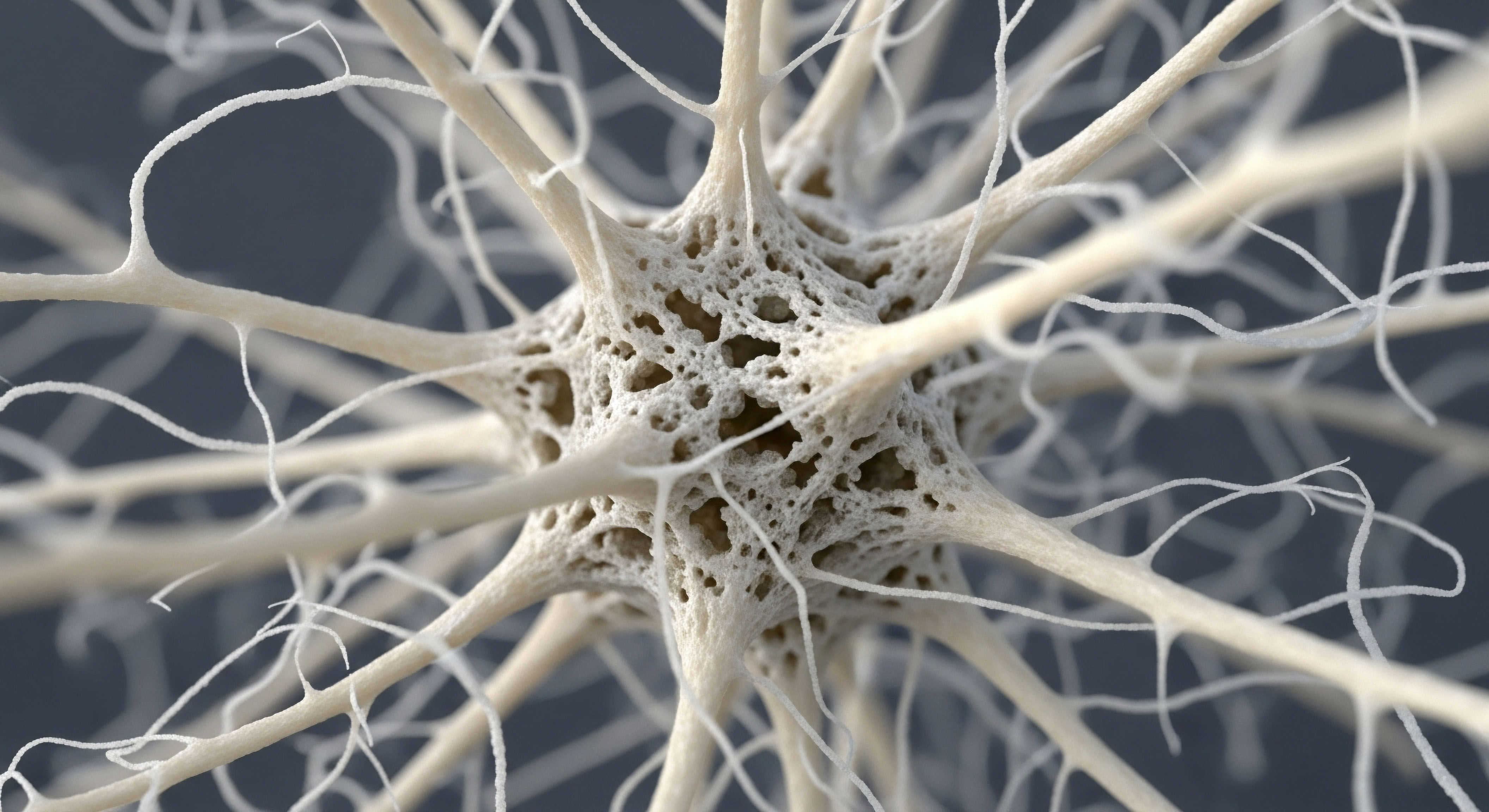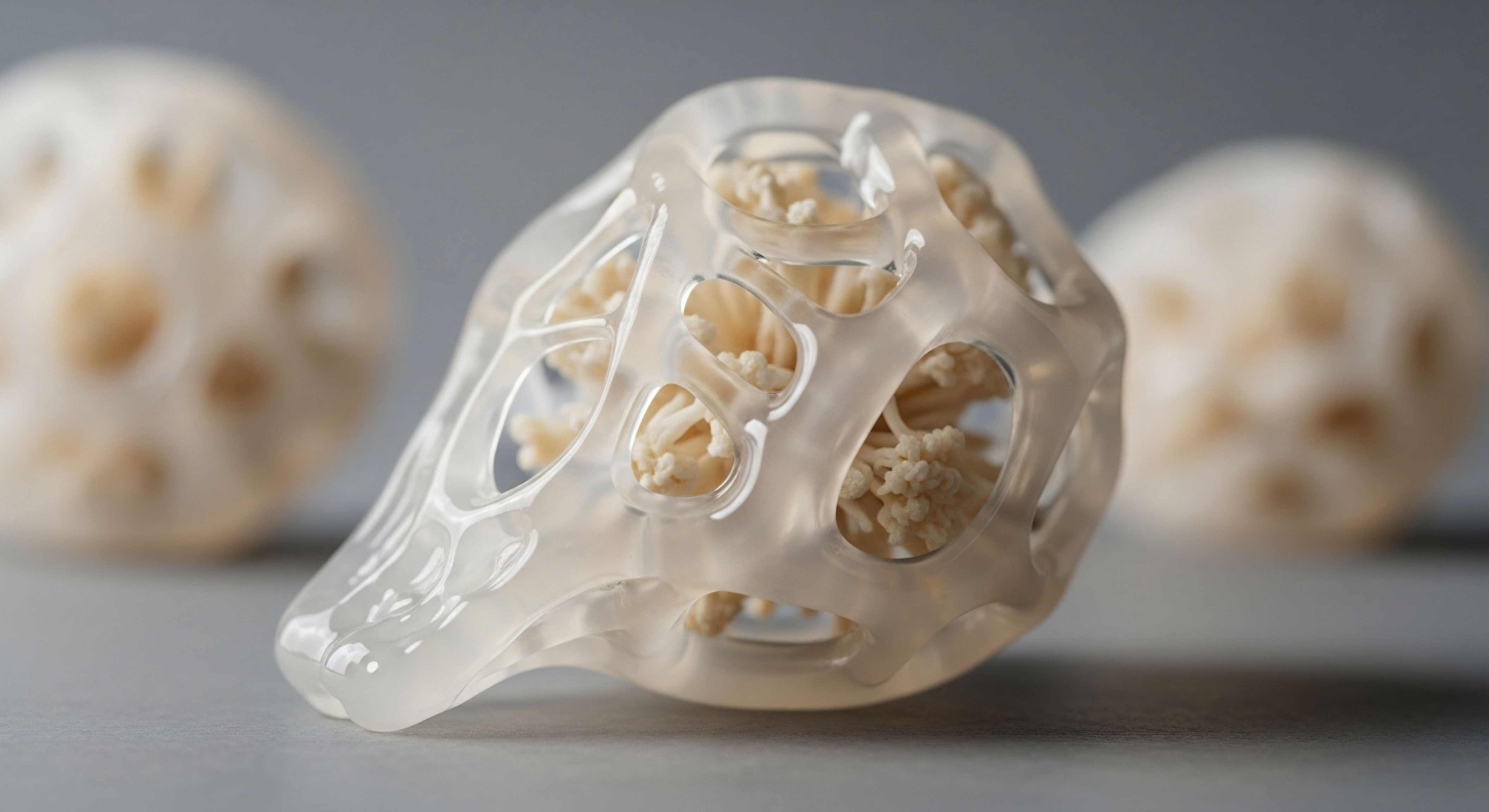

Fundamentals
Experiencing the symptoms of Polycystic Ovary Syndrome often feels like navigating an unpredictable landscape within your own body. The journey involves irregular menstrual cycles, unexpected hair growth, persistent acne, and struggles with weight management, each a tangible manifestation of an underlying biological imbalance.
These experiences are not isolated occurrences; they represent a complex symphony of endocrine and metabolic dysregulation impacting your overall well-being. Recognizing that PCOS presents a spectrum of individual expressions, known as phenotypes, marks the initial step toward truly effective, sustained interventions. Your unique biological blueprint guides the pathway to reclaiming vitality.
Polycystic Ovary Syndrome, a prevalent endocrine condition affecting women of reproductive age, manifests through a diverse array of clinical presentations and underlying pathophysiologies. This heterogeneity underscores the necessity of a personalized approach to management, moving beyond generic recommendations to address the specific drivers of your symptoms.
Understanding your particular PCOS phenotype ∞ whether characterized by pronounced insulin resistance, significant inflammatory markers, or elevated adrenal androgens ∞ provides the foundation for tailoring lifestyle strategies that resonate with your individual physiology. Such a precise understanding empowers individuals to engage actively in their health journey.
Understanding your unique PCOS phenotype establishes the groundwork for tailored lifestyle interventions that truly address your specific biological needs.
The endocrine system, a sophisticated network of glands and hormones, orchestrates virtually every bodily function, from metabolism and mood to reproduction and energy levels. When this intricate system experiences disruption, as in PCOS, the repercussions extend throughout the body. Hormones, functioning as the body’s internal messaging service, communicate vital instructions to cells and tissues.
Metabolic processes, which govern how your body converts food into energy, are inextricably linked to hormonal balance. Lifestyle interventions, meticulously aligned with your specific phenotype, offer a powerful mechanism to recalibrate these fundamental systems, fostering a profound sense of internal balance and long-term resilience.

What Does Phenotype-Guided Intervention Mean for You?
A phenotype-guided approach acknowledges that while many women receive a PCOS diagnosis, the precise mechanisms driving their symptoms vary considerably. This distinction is paramount for crafting an intervention that targets the root causes rather than merely addressing superficial symptoms.
For instance, an individual primarily exhibiting insulin resistance benefits from strategies specifically designed to enhance glucose metabolism, while someone with significant adrenal androgen excess requires protocols focused on stress modulation and adrenal support. This tailored methodology respects the intricate nature of your body’s systems, paving the way for sustained improvements in health and function.


Intermediate
Transitioning from a general understanding of PCOS to specific, phenotype-guided lifestyle interventions involves a deeper appreciation of the biological mechanisms at play. These interventions function as powerful levers, precisely modulating key endocrine and metabolic pathways to restore systemic equilibrium. Rather than a blanket approach, a personalized strategy acknowledges the specific hormonal and metabolic deviations present in your unique PCOS phenotype, ensuring a more effective and enduring response. This targeted application of lifestyle modifications underpins their long-term efficacy.

How Do Lifestyle Interventions Recalibrate Insulin Sensitivity?
Insulin resistance frequently stands as a central metabolic characteristic across many PCOS phenotypes, driving hyperandrogenism and exacerbating reproductive dysfunction. Phenotype-guided dietary adjustments, such as those emphasizing a low-glycemic index, play a significant role in improving insulin sensitivity. These dietary patterns help stabilize blood glucose levels, reducing the pancreatic demand for insulin and thereby diminishing circulating insulin concentrations.
Lower insulin levels directly correlate with a reduction in ovarian androgen production and an increase in sex hormone-binding globulin (SHBG), which binds to testosterone, rendering it less active. Physical activity, encompassing both aerobic and resistance training, further augments insulin sensitivity by enhancing glucose uptake in muscle cells, effectively allowing the body to utilize insulin more efficiently.
Targeted dietary and exercise protocols significantly enhance insulin sensitivity, reducing hyperandrogenism and supporting reproductive health.
Beyond macronutrient composition, specific dietary patterns like the Mediterranean diet, rich in anti-inflammatory compounds, and high-fiber diets contribute to metabolic health by supporting gut microbiome diversity and integrity. A healthy gut environment positively influences insulin signaling and reduces systemic inflammation, which often coexists with insulin resistance in PCOS.

Modulating Androgen Production and Ovarian Function
Excessive androgen production, a hallmark of PCOS, originates from both ovarian and adrenal sources, depending on the individual’s phenotype. Lifestyle interventions offer distinct advantages in addressing both. For ovarian hyperandrogenism, the improvements in insulin sensitivity directly translate into reduced androgen synthesis within the ovaries.
For individuals with an adrenal androgen excess phenotype, stress management techniques become paramount. Chronic psychological stress elevates cortisol and dehydroepiandrosterone sulfate (DHEA-S) from the adrenal glands, which can contribute to elevated androgen levels. Mindfulness practices, adequate sleep, and targeted nutritional support (e.g. magnesium, B vitamins, adaptogenic herbs) assist in modulating the hypothalamic-pituitary-adrenal (HPA) axis, thereby reducing adrenal androgen output.
The consistent application of these tailored lifestyle strategies fosters a more balanced hormonal milieu, leading to tangible improvements in reproductive parameters. This includes more regular ovulatory cycles and, for many, an increased likelihood of conception. The reduction in androgenic symptoms such as hirsutism and acne further enhances an individual’s quality of life and self-perception.
| PCOS Phenotype Driver | Key Lifestyle Interventions | Primary Biological Mechanisms |
|---|---|---|
| Insulin Resistance | Low-glycemic index diet, regular aerobic and resistance exercise, caloric modulation. | Enhances cellular glucose uptake, reduces pancreatic insulin demand, increases SHBG. |
| Inflammatory Markers | Anti-inflammatory diet (rich in omega-3s, antioxidants), stress reduction, gut microbiome support. | Decreases pro-inflammatory cytokines, improves gut barrier function, modulates immune response. |
| Adrenal Androgen Excess | Stress management (mindfulness, adequate sleep), adaptogenic herbs, targeted nutritional support. | Modulates HPA axis activity, reduces DHEA-S production, balances cortisol rhythms. |
| Ovarian Dysfunction | All above, particularly those improving insulin sensitivity and reducing hyperandrogenism. | Restores regular ovulatory cycles, balances LH/FSH ratio, supports follicular development. |

What Are the Metabolic and Reproductive Benefits of Sustained Lifestyle Shifts?
The long-term benefits of phenotype-guided lifestyle interventions extend beyond immediate symptom alleviation, establishing a foundation for sustained metabolic and reproductive health. Consistent adherence to these protocols significantly mitigates the long-term risks associated with PCOS, including the progression to type 2 diabetes, cardiovascular disease, and endometrial hyperplasia.
The cumulative effect of improved insulin sensitivity, reduced inflammation, and balanced androgen levels creates a more resilient physiological state. This proactive engagement with one’s biological systems truly defines the long-term value of these interventions.
-
Metabolic Health Optimization ∞
- Improved Glucose Homeostasis ∞ Sustained dietary and exercise modifications lead to consistently lower fasting insulin and glucose levels, preventing the chronic hyperinsulinemia that drives many PCOS complications.
- Favorable Lipid Profiles ∞ Reductions in LDL cholesterol, total cholesterol, and triglycerides, alongside increases in beneficial HDL cholesterol, contribute to a significantly lower cardiovascular risk over time.
- Weight Management ∞ For individuals with obesity, even modest weight loss (5-10% of body weight) through tailored lifestyle interventions dramatically improves reproductive and metabolic outcomes, a benefit that endures with consistent effort.
-
Reproductive Function Enhancement ∞
- Menstrual Regularity ∞ The recalibration of hormonal axes often restores predictable ovulatory cycles, a fundamental aspect of reproductive health.
- Enhanced Fertility ∞ Improved ovulation rates and hormonal balance contribute to increased conception rates for those desiring pregnancy.


Academic
The profound efficacy of phenotype-guided lifestyle interventions for Polycystic Ovary Syndrome stems from their capacity to engage with the very molecular and cellular underpinnings of the condition. This academic exploration moves beyond observable symptoms, delving into the intricate interplay of gene expression, cellular signaling pathways, and the commensal microbiome, revealing how sustained lifestyle adjustments foster deep, systemic recalibration.
Our focus here centers on the pervasive influence of these interventions on metabolic memory and epigenetic modulation, offering a sophisticated lens through which to comprehend their enduring benefits.

How Do Lifestyle Interventions Modulate Epigenetic Pathways in PCOS?
Epigenetic modifications, such as DNA methylation, histone modifications, and microRNA activity, represent dynamic regulatory mechanisms that influence gene expression without altering the underlying DNA sequence. These epigenetic “switches” can be profoundly influenced by environmental factors, including diet and physical activity, thereby offering a compelling explanation for the long-term benefits of lifestyle interventions in PCOS. Research indicates that individuals with PCOS often exhibit distinct epigenetic signatures in genes associated with insulin signaling, steroidogenesis, and inflammatory responses.
Lifestyle interventions can dynamically alter gene expression through epigenetic mechanisms, offering a reversible pathway to mitigate PCOS pathophysiology.
For instance, studies in letrozole-induced PCOS rat models have demonstrated that regular exercise and alternate-day feeding can improve glucose tolerance, reduce weight gain, and enhance ovarian function by influencing DNA methylation enzymes.
Specifically, a decrease in DNA methyltransferase (DNMT1 and DNMT3B) expression and an increase in DNMT3A expression were observed in treated groups, suggesting that these interventions epigenetically modulate gene expression via chromatin modifier enzyme changes.
This dynamic interplay highlights how conscious lifestyle choices can re-program cellular responses, moving beyond mere symptom management to address the root causes of dysregulation at a genomic level. The reversibility of these epigenetic changes presents a compelling therapeutic avenue for managing and potentially preventing PCOS progression.

The Gut Microbiome as a Metabolic and Endocrine Regulator in PCOS
The gut microbiome, a complex ecosystem of microorganisms residing within the digestive tract, plays an increasingly recognized role in metabolic and endocrine health, holding particular relevance for PCOS pathophysiology. Dysbiosis, an imbalance in the gut microbial community, frequently accompanies PCOS and contributes to insulin resistance, chronic low-grade inflammation, and hyperandrogenism.
Lifestyle interventions, particularly dietary modifications rich in fiber and diverse plant-based foods, actively reshape this microbial landscape. Fiber, serving as a “microbiota accessible carbohydrate,” promotes the growth of beneficial bacteria that produce short-chain fatty acids (SCFAs) like butyrate. SCFAs enhance intestinal barrier integrity, reduce systemic inflammation, and positively influence insulin signaling pathways in peripheral tissues.
Furthermore, gut bacteria participate in the enterohepatic circulation of bile acids, which are critical signaling molecules impacting glucose and lipid metabolism. Alterations in bile acid metabolism, driven by dysbiotic gut microbiota, contribute to the metabolic disturbances seen in PCOS.
Lifestyle interventions that restore eubiosis ∞ a balanced microbial state ∞ can therefore mitigate insulin resistance and inflammation, thereby reducing androgen excess and improving ovarian function. The gut-brain axis, a bidirectional communication pathway, also mediates stress responses and mood, both of which are often dysregulated in PCOS; a healthy microbiome supports optimal function along this axis.
| Biological System | Key Molecular Mechanisms Influenced | Long-Term Clinical Impact |
|---|---|---|
| Epigenetics | DNA methylation patterns, histone modifications, microRNA expression. | Reversible gene expression modulation, sustained metabolic and hormonal balance, reduced disease progression. |
| Gut Microbiome | SCFA production, bile acid metabolism, intestinal barrier integrity, inflammatory mediator modulation. | Improved insulin sensitivity, reduced systemic inflammation, balanced androgen levels, enhanced gut-brain axis function. |
| Insulin Signaling | Receptor sensitivity, post-receptor signaling cascades (e.g. PI3K/Akt pathway), glucose transporter translocation. | Sustained glucose homeostasis, prevention of type 2 diabetes, reduced ovarian androgen synthesis. |
| Inflammatory Pathways | Cytokine production (e.g. TNF-α, IL-6), NF-κB activation, oxidative stress markers. | Reduced chronic low-grade inflammation, improved endothelial function, decreased cardiovascular risk. |

Does Lifestyle Intervention Reduce Long-Term Comorbidity Risk in PCOS?
The long-term benefits of phenotype-guided lifestyle interventions are underscored by their capacity to significantly reduce the risk of serious comorbidities associated with PCOS. Chronic hyperinsulinemia and inflammation, central to many PCOS phenotypes, contribute to an elevated risk of type 2 diabetes and cardiovascular disease.
By addressing these core pathophysiological drivers through tailored dietary and exercise protocols, individuals can achieve sustained improvements in glucose homeostasis, lipid profiles, and endothelial function. Meta-analyses of randomized controlled trials consistently demonstrate that lifestyle modifications lead to significant reductions in fasting insulin, HOMA-IR, total cholesterol, LDL cholesterol, and triglycerides. These improvements translate into a lower incidence of metabolic syndrome and a reduced likelihood of developing cardiovascular complications over decades.
Moreover, the restoration of regular ovulatory cycles through these interventions mitigates the risk of endometrial hyperplasia, a precursor to endometrial cancer, which is elevated in women with chronic anovulation. The sustained impact on hormonal balance, metabolic markers, and systemic inflammation collectively contributes to a more robust physiological state, effectively re-writing the long-term health trajectory for individuals with PCOS.
The integration of behavioral and psychological support within these lifestyle programs also addresses the mental health challenges, such as anxiety and depression, often experienced by women with PCOS, further enhancing overall quality of life and adherence to these beneficial changes.

References
- Malhotra, Neena, et al. “The Role of Lifestyle Interventions in PCOS Management ∞ A Systematic Review.” Nutrients, vol. 17, no. 2, 2025, p. 306.
- Shangguan, Feng, et al. “Effectiveness and acceptability of different lifestyle interventions for women with polycystic ovary syndrome ∞ protocol for a systematic review and network meta-analysis.” BMJ Open, vol. 14, no. 10, 2024, p. e084815.
- Thomson, Rebecca L. et al. “Lifestyle management in polycystic ovary syndrome ∞ beyond diet and physical activity.” BMC Medicine, vol. 21, no. 1, 2023, p. 16.
- Oana. “PCOS and Epigenetic Modifications ∞ What to Know.” Oana, 2023.
- Oana. “Molecular Mechanisms of Insulin Resistance in PCOS.” Oana, 2023.
- Ying, Wei, et al. “Reshaping the Gut Microbiota Through Lifestyle Interventions in Women with PCOS ∞ A Review.” Frontiers in Endocrinology, vol. 13, 2022, p. 863214.
- Qi, Xiaoyan, et al. “Gut microbiota and innate immunity in polycystic ovary syndrome ∞ Current updates and future prospects.” Clinical and Experimental Reproductive Medicine, vol. 51, no. 1, 2024, pp. 1-13.
- Aujla, Tanveer, et al. “Do lifestyle tweaks to tackle adrenal PCOS help? Experts weigh in.” The Indian Express, 31 July 2023.
- Brighten, Jolene. “Adrenal PCOS ∞ Holistic Strategies to Manage Stress and PCOS.” Dr. Jolene Brighten, 8 Apr. 2024.
- Zhai, Yan, et al. “Ovarian epigenetics modifications following lifestyle interventions by exercise and alternate-day feeding in letrozole-induced PCOS rats.” Journal of Ovarian Research, vol. 18, no. 1, 2025, p. 7.

Reflection
The exploration of phenotype-guided lifestyle interventions for Polycystic Ovary Syndrome reveals a profound truth ∞ your body possesses an inherent capacity for balance and resilience when provided with the precise inputs it requires. This knowledge marks the initial step, a powerful invitation to introspection about your unique health journey.
Understanding your biological systems empowers you to become an active participant in your well-being, moving from passive observation to informed action. The path to reclaiming vitality and function without compromise lies within a deeper connection to your own physiology, a journey best undertaken with personalized guidance and unwavering self-compassion.



